
The work Missing Links, A Book in Ten Sessions, by CineLab member Lucas Ferraço Nassif, has just been published by Barakunan. The book is an elaboration on the work of art in Gilles Deleuze and Félix Guattari through description, time, cosmology, and desire production. The films of Chantal Akerman, alongside Anne Carson and Ludwig Wittgenstein, are his main objects of study.
In Missing Links, Lucas Ferraço Nassif instructs that “cinema exists in the tension of desires, from everything that is in the game”. And “what is in the game vibrates”, or becomes perceptible in the tempo of film and filmic thought that somehow promises to reveal the nature of this world (maybe, a world that’s about to end). To approach such perception is to submit to description, says Nassif, and then proceeds to investigate the act of describing in all its perilous demand and exhausting impossibility. What can we know, after all, of Chantal Akerman’s Jeanne Dielman, at whom we look and look? Or of any seemingly-unified object that, in being worthy of our attention, must be recognized most fundamentally for the way it slips and blurs? I’m dazzled by this writer’s courage to “work on the void”, to tilt, heart in mouth, at ghosts and ruins. This is the drama I came for. — Matt Longabucco
Inside the cracks in Lucas Ferraço Nassif’s cinecriticism is an elegy for Chantal Akerman, born the same year as me and Anne Carson too, both here hailed. This elegy is composed as a montage that tells the tale of the Jewish filmmaker as desperado fleeing Sherriff Jean-Luc Godard on a runaway midnight train to Rio, which makes an unscheduled stop in Wittgenstein, Montana. What with all the humming, you just can’t see it. Or if you can, you can’t describe it. “We have nowhere else to start.” — Charles Bernstein
Lucas Ferraço Nassif’s expansive, rhizomatic project is “full” of missing links in the sense of plenitude: a surfeit of references, genres, affects, and paths for the reader to follow, the listener to harken, the viewer to watch. In the process of tracing affinities between the cast of characters in the intellectual drama staged here — from Jean-Luc Godard to Ludwig Wittgenstein, Anne Carson to Chantal Akerman, Gilles Deleuze to Jacques Lacan, and beyond — we have the chance to reconsider the articulations and boundaries, the flows and stoppages, between film and writing, autobiography and criticism, theory and practice. Missing Links is a ciné-poème of flickering, delicate attention that compels our immersion in turn. — Craig Dworkin
Missing Links, A Book in Ten Sessions
Nassif, L. F.
The Open Access version of this book is available here.

